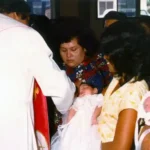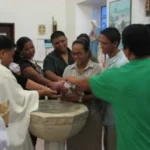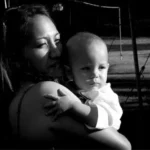Nina/Ninu



Table of Contents
Share This
Godparents
Nina (patlina) and Ninu (patlino), meaning godmother and godfather in the Mariana Islands respectively, are borrowed terms from the Spanish padrina and padrino. These terms are derived from Spanish Catholicism and describe the relationship between the godparents and their godchild. Specifically, godchildren address their godparents using these terms.
This relationship is formally sealed in a Catholic baptismal ceremony or baotismo in which godparents pledge to assist parents in raising their child in the Christian faith through the Catholic tradition. In the event of the godchild’s marriage, the nina and ninu act as witnesses at the wedding and share some responsibilities in the planning or financing (chenchule yan inayuda) of the fandånggo (wedding reception).
Godparents are the official chaperones of the event and are given special seating at the bridal table during the reception to honor them, and as a sign of respect. Examples of godparents’ duties during weddings include from the bride’s nina, a lavish wedding cake being. The groom’s ninu would provide the drinks for the reception and a band for entertainment.
Godparents are chosen from the familia (family), such as a sibling of a parent, cousin, aunt, or uncle, and are selected through careful discernment by one or both parents. Close friends, neighbors, or co-workers are also added to this list of prospective godparents in contemporary times.
Although the godparent relationship was originally based on the Sacrament of Baptism, CHamoru/Chamorro parents have adapted this arrangement to another Catholic Sacrament, that is, the initiation sacrament of Confirmation. In the religious context, the young person being confirmed is sponsored by a Christian adult who is of the same gender, and who attests to the confirmant’s maturity in the Christian Faith. Most CHamorus, therefore, may have two sets of godparents, one through Baptism and one through Confirmation. The latter, however play a more symbolic or honorary role, and are considered less significant than the social and religious role of baptismal godparents.
A nina, more so than a ninu, plays an integral and constant role in the religious and social formative life of the godchild. In terms of religious formation, she ensures that her godchild receives the necessary church sacraments such as Holy Communion, Confirmation, Marriage, and in some cases Anointing of the Sick and Ordination. In terms of socialization and enculturation, a nina participates in the personal and significant events of the godchild’s life including birthdays, Christmas, graduation, and other personal achievements.
For CHamorus, these terms convey more than just a religious responsibility to the child, but also a social obligation to the child’s larger extended family. The arrangement is part of a constellation of relationships that ensure the welfare of the family and reinforcing practices of inafa’maolek, the CHamoru system of reciprocation.
By Antonio Salas, MA
For further reading
Catechism of the Catholic Church. Vatican City: Libreria Editrice Vaticana, 1993.
Chamorro Heritage, A Sense of Place: Guidelines, Procedures and Recommendations For Authenticating Chamorro Heritage. The Hale’-ta Series. Hagåtña: Department of Chamorro Affairs, Research, Publication and Training Division, 2003.
Hattori, Anne Perez. Colonial Dis-ease: U.S. Navy Health Policies and the Chamorros of Guam, 1898-1941. Pacific Islands Monograph Series 19. Honolulu: University of Hawai’i Press, 2004.
Jorgensen, Marilyn A. Guam’s Patroness: Santa Marian Kamalen. N.p., 1994.
Quan, John F. “The Compradrazgo System of Guam.” PhD diss., Marquette University, 1976.
Rogers, Robert. Destiny’s Landfall: A History of Guam. Honolulu: University of Hawai’i Press, 1995.
